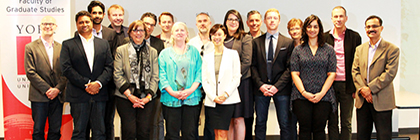Seven York graduate students celebrated the receipt of their Thesis & Dissertation Prizes with faculty colleagues and program directors at a recent luncheon honouring their research contributions.
“This is one of those great opportunities where we get to celebrate the excellent work of our students,” said Fahim Quadir, interim dean of the Faculty of Graduate Studies, who noted there were close to 500 completed graduate degrees last year.
The Thesis & Dissertation Prizes are distributed by the Faculty of Graduate Studies (FGS) to celebrate exceptional master’s and PhD theses from the previous calendar year.
 Master’s recipients
Master’s recipients
Karam Al Masri, film, Juha the Whale
Al Masri’s thesis is a 13-minute short film that explores the isolation a refugee mother and her young daughter face as they await the status of their claimant hearing in Toronto.
Internal examiner Wenona Giles stated of the film: “Al Masri explores relationships between gender and refugee access to Canada; the impacts of the exile experience on parenting, and on parents and their children; the trauma and loneliness of the refugee experience; and also the strength and tenacity of the human spirit.”
John Greyson, Al Masri’s supervisor and graduate program director in film, said, “This confirms what we knew when we met you. [Karam’s film] combines her twin passions for cinema and social justice.” He noted at the same time she was working towards a master’s in film she was also completing an arts MBA at Schulich.
Juha the Whale was screened to the York community in November as part of the Depth of Field series, featuring the work of MFA alumni and graduating students.
Salman Chaudhry, earth and space science, On the Characterization of Engineered Elastomers At High Strain Rates
Chaudhry’s work explores finite element modelling and material characterization of elastomers. His research is notable as it provides a useful deign for testing, for which standards currently lack in the development of elastomer components for applications.
During his master’s, he served as co-author on seven international conference publications and presentations, as well as three journal papers. The examining committee noted that his intellectual proficiency and output was at the level one might expect of a doctoral student. Chaudhry thanked his supervisor Alex Czekanski for his support and expertise during his degree.
Kathryn Hardill, nursing, That Look That Makes You Not Really Want to Be There: Health Care Experiences of People Who Use Illicit Opioids in Small Urban and Rural Communities – A Critical Social Theory Analysis
Hardill’s research examines a timely and important topic impacting our health-care system and offers valuable insight for the nursing community. Through 17 interviews with 10 opiate users and six interviews with nurses who care for these individuals, her data and analysis provides critical information to influence future health policy in this area.
Graduate Program Director Jacqueline Choiniere, attending on behalf of supervisor Cheryl van Daalen-Smith, read van Daalen-Smith’s remarks. She called Hardill “a Canadian nursing icon whose work I followed. Her research critically explored the health-care experience of marginalized persons whose voices would otherwise be dismissed.”
Hardill said, “It has been exhilarating to be able to marry two of my passions: providing nursing care to people who have been marginalized and my political world view.”
Doctoral Recipients
Melissa Dalgleish, English, Her Constellated Mind: Jay Macpherson’s Modernism and the Canadian Mythopoeic Turn
Dalgleish’s thesis looks at the first 20 years of Canadian poet Jay Machperson’s career and examines her mythopoeic modernism and its influence in post-war Canadian poetry.
Noted was her exemplary archival work in regards to fonds used for critical insight. The examining committee stated: “The diplomatic, investigative and archival work required to compile the primary materials for the study were, in a word, monumental, and have results in a an archive that will be foundational for future scholarship in the field.”
The Essential Jay Macpherson, with selections by Melissa Dalgleish, was published by The Porcupine’s Quill earlier this year.
Supervisor Lily Cho said one of the amazing things about the amount of research Dalgleish did, was that she published a book before defending.
“What’s not in the dissertation is almost as riveting as what’s in the dissertation,” said Cho. “There are another two or three books there.”
Dalgleish is currently a professional and career development specialist at the Hospital for Sick Children in Toronto. Prior to this, she served as the research officer in the Faculty of Graduate Studies, and coordinated the launch of the Graduate & Postdoctoral Professional Skills program (gradstudies.yorku.ca/gpps).
Angus Gavin Grant, law, Confronting (In) Security: Forging Legitimate Approaches to Security and Exclusion in Migration Law
Grant’s work explores national security considerations in Canadian immigration law and, through interviews with migrants, makes significant contributions to the discourse between immigration and security policies.
The examining committee noted: “Mr. Grant’s fine-grained analysis of the relevant Canadian case law is manifestly infused with the minutiae of his professional background as a practising lawyer, allowing him to mesh very convincingly theoretical thoughts with practical considerations.”
Speaking on behalf of supervisor Sean Rehaag, Graduate Program Director Sonia Lawrence said, “Angus is an exceptional scholar. This dissertation is a first-rate work of law and society scholarship.” She pointed out he came to the graduate program in law after a decade of practise in the area of refugee law.
Grant said there were times he “felt slightly fraudulent. I had been in legal practice for more than a decade.” But he said he was able to draw on that experience to help him explore how the law is operating on people.
Paul Christopher Gray, political science, The Tragedy of Marx and Justice: A Critique of Marx’s Failed Attempt to Dispense with Principles of Justice
Gray’s research examines Karl Marx’s theory of justice and its deployment, and contributes to broader debates in contemporary political philosophy. Citing its foundation in philosophy, expert use of detail and its originality, the examining committee noted an outstanding contribution to the scholarship of Marx.
Supervisor David McNally said the supervisor’s job, as he sees it, “is to get out of the way when you know your are dealing with a candidate who is on fire.”
Gray was one of those candidates, he noted, and periodically, his job was to just throw a log onto the fire. His dissertation “not only said something new, he simply said, ‘Here’s an entirely different way of looking at it.’ ”
Gray commented that McNally “fed more logs for that fire than he knows.” Gray also added that most Marxist scholars have just accepted that Marx is incredibly ambiguous and vague about justice. “None of them thought to critique Marx according to a Marxist approach.”
Dennis Kolosov, biology, The Role of Tight Junction Proteins in Regulating Epithelial Permeability in Fishes
Kolosov’s research examines the composition of tight junctions in teleost fish, and consists of a number of molecular level experiments conducted at York. A better understanding of these proteins is an important contribution to a number of research areas including gene cloning and pharmacology, among others.
“I feel very lucky to have students in my lab like Dennis,” said supervisor Scott Kelly.
“It’s easy enough to do the work you’re excited about,” Kolosov said, “it’s harder to do the stuff so that it excites other people.” In addition to his thesis, Kolosov has published in 10 academic journals in the field of comparative and epithelial physiology, and is the lead or second author on two invited review articles in international journals.
Quadir said to the recipients, “The seven of you were chosen from a large number of students who are already doing wonderful work. All of you have shown excellence in research and writing.”




 Master’s recipients
Master’s recipients
 Cook has held many positions since joining Schulich in 1972, including: associate dean, Student Affairs; PhD program director; chair of Tenure and Promotions Adjudication Committee; area coordinator, OMIS; and associate dean of Research.
Cook has held many positions since joining Schulich in 1972, including: associate dean, Student Affairs; PhD program director; chair of Tenure and Promotions Adjudication Committee; area coordinator, OMIS; and associate dean of Research.
 Clairman, president and CEO of Plug ‘n Drive, says work experience for students is a key stepping stone to career success.
Clairman, president and CEO of Plug ‘n Drive, says work experience for students is a key stepping stone to career success. Located at Dufferin and Finch, the EVDC is the first facility of its kind in the world. The centre provides an experiential learning environment for electric vehicles, where visitors can learn the environmental and economic benefits of driving an electric vehicle, read up-to-date information on government incentives, and can even test drive the latest electric vehicle models from leading manufacturers, including the BMW i3, the Chevrolet BOLT, Ford C-Max Energi and the Nissan LEAF.
Located at Dufferin and Finch, the EVDC is the first facility of its kind in the world. The centre provides an experiential learning environment for electric vehicles, where visitors can learn the environmental and economic benefits of driving an electric vehicle, read up-to-date information on government incentives, and can even test drive the latest electric vehicle models from leading manufacturers, including the BMW i3, the Chevrolet BOLT, Ford C-Max Energi and the Nissan LEAF.
 Noseworthy will put the $190,000 grant to good use by exploring the real-world impact of how dressed-up junk food can hinder peoples’ ability to self-regulate consumption, leading to over-consumption. The ERA will help Noseworthy build on his innovative research.
Noseworthy will put the $190,000 grant to good use by exploring the real-world impact of how dressed-up junk food can hinder peoples’ ability to self-regulate consumption, leading to over-consumption. The ERA will help Noseworthy build on his innovative research.















